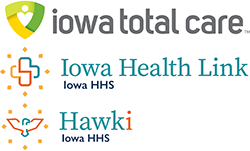Dental Care
Iowa Total Care only covers dental procedures done in a hospital setting. For specific questions about your dental benefits, call Iowa Medicaid Member Services at 1-800-338-8366. These services are not part of those provided by Iowa Total Care.
Iowa Medicaid Members
- Enrolled in a Dental Wellness Plan:
- Delta Dental of Iowa
- Member Services Phone: 1-888-472-2793
- MCNA Dental
- Member Services Phone: 1-855-247-6262
- Delta Dental of Iowa
Hawki Members
- Dental benefits through Delta Dental of Iowa
- Member Services Phone: 1-800-544-0718
A healthy mouth is an important part of your wellbeing. Tooth decay and gum disease can make it difficult to do things like talk with your friends, enjoy your food, or even laugh at a joke. Do you care for your mouth as well as you should? Take control now to keep your mouth healthy.
You should visit the dental office every 6 months. During your visit, your dental provider will make sure your teeth and gums are healthy. If problems are found, your dentist or dental hygienist will advise self-care and treatment.
Your Dental Evaluation
Since oral health is linked to general health, your visit will likely start with a health history. Tell your dental provider about any health problems you have or medicines you take.
Depending on what your health history, the rest of your visit may include the following:
- Look for signs of oral cancer. This includes feeling your neck and throat and looking inside your mouth.
- Examine your teeth. If you have any tooth decay, it will be marked on your dental record. Notes will be made about any restorations, such as fillings or cracked teeth.
- Examine your gums. A probe is used to measure any areas where the gum has separated from the tooth (pockets) and gum recession. Your dentist or dental hygienist will also evaluate any bleeding that occurs. Bleeding gums can be a sign of gum disease.
- Take X-rays, pictures, and molds of the teeth (impressions), if needed. These will be put in your record so your dentist or dental hygienist can refer to them at your next visit. This helps keep track of any changes to your mouth over time.
- A cleaning. This helps prevent gum disease. Your dental provider will clean below the gumline, where your toothbrush and floss can’t reach.
- A cosmetic polishing. This removes stains on the surfaces of your teeth (if needed).
- Further evaluation and treatment. Your dental provider will talk about any problems they find.
- Home care instructions. Your dental provider will tell you how to give your teeth and gums the best care at home.
Benefits of a Healthy Mouth
Why is it important to care for your teeth and gums? For one thing, what goes on in your mouth can affect the rest of your body. Poor oral health is linked to problems such as heart disease, stroke and diabetes. But that’s not all. If you’re pregnant, caring for your teeth and gums can help make sure your baby is born on time and healthy. Good oral health can also:
- Help you chew and digest your food.
- Keep your mouth comfortable and pain-free.
- Help you speak clearly.
- Keep your breath fresh.
- Keep you looking and feeling good. And when you feel good about your mouth, you’re more likely to smile!

